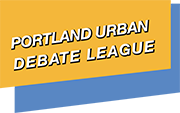Why Debate Matters
GPAs and Graduation
Urban Debate League debaters have better grades and are far more likely to graduate high school than non-debaters, as decades worth of data now confirm. As one researcher summarized after studying data from multiple U.D.L.s across the United States, “Two results are clear–debaters achieve significantly higher grades and intend to attend college at a substantially greater rate than their non-debating peers” [emphasis added] (Collier, L.M., November 2004, Argument for success: A study of academic debate in the urban high schools of Chicago, Kansas City, New York, St. Louis and Seattle. Paper presented at the National Communications Association Convention, Chicago, IL). Specifically, they improve literacy scores by 25%, improve G.P.A.s by 10%, and graduate nearly 100% on time (Collier, 2004).
Multiple scholarly articles and independent evaluations have found major student benefits from participating in an urban debate league, including both higher standardized test scores and higher graduation rates, in various cities. An independent study by the Minneapolis Public Schools’ Research, Evaluation and Assessment Department found that participants in the Minneapolis U.D.L. made improvements in standardized tests and school attendance. Each debate round of participation was correlated with a 1% higher school attendance rate. Given that debaters had up to 17 rounds of competition in a year, the effect could be quite large for some students (“2014-15 Urban Debate League MPS Evaluation”, September 2015).
One challenge in analyzing the data is that debate attracts stronger students, which may cause self-selection bias in the results. However, administrative-level data from Chicago has allowed researchers to control for self-selection. The data set, covering a decade of U.D.L. participation from 1997 to 2007, crucially contained the eighth-grade (pre-debate) standardized test scores. Using this as a control variable, Dr. Mezuk (2009) determined how much of the beneficial outcomes in G.P.A. and graduation rates were attributable to debate experience in a study of approximately 12,000 students. African American males had G.P.A.s nearly half a letter grade higher due to debating and were nearly 70% more likely to graduate–even after controlling for eighth-grade test scores (Mezuk, “Urban Debate and High School Educational Outcomes for African American Males”, Journal of Negro Education, Summer 2009).
Using the same data set, researchers further found similar benefits to debating for all at-risk students. In the highest risk group (students with the lowest standardized test scores prior to debate, the lowest socioeconomic status, learning disabilities, and so forth), only 43% of non-debaters graduated, while 72% of a matched group of debaters with the same risk scores graduated, a 67% improvement for the most at-risk students (Anderson & Mezuk, “Participating in a Policy Debate Program”, Journal of Adolescence, 2012). Overall, including every risk group, debaters were 19% likelier to graduate, with bigger gains made among higher risk groups. Simply put, this is an extremely large effect compared to the decidedly modest effects researchers have found for with other extra- and co-curricular activities (Anderson & Mezuk, 2012).
The mechanisms by which debate participation hooks debaters into being better students and graduating on time are quite clear:
UDLs equip students to take advantage of learning opportunities available through the traditional school curriculum in four distinct ways: (a) …. creating relationships where students gain recognition, feedback, and perspective; (b) …. competitions that tangibly reward hard work (i.e., through trophies and recognition by school officials); (c) …. shifting the relationship to scholastic achievement and raising expectations; and (d) …. doing focused, independent work on college-level assignments, an approach proven to be a highly effective tool for improving academic achievement in secondary education settings. (Mezuk, 2009).
No other activities outside of regular school hours–and indeed, few during school hours–are so powerfully transformative of students’ academic self-image, skills, relationships, and outcomes, all at once.
